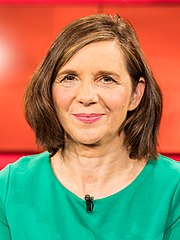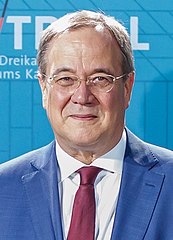2022 German presidential election
| ||||||||||||||
| ||||||||||||||
| ||||||||||||||
The 2022 German presidential election (officially the 17th Federal Convention) will be held in Germany no later than thirty days before the sitting President's term ends, as mandated by the German Constitution, the Grundgesetz, unless the presidency falls vacant prematurely. On 19 March 2017 Frank-Walter Steinmeier, who was elected by the 16th Federal Convention on 12 February 2017, entered office and started his first five-year-term as President. Therefore the next Federal Convention will convene no later than 16 February 2022. The Bundestag's council of elders has scheduled the 17th Federal Convention for 13 February 2022.[1] If Steinmeier's term ends prematurely, the Federal Convention will meet no later than thirty days after the start of the vacancy.[2]
Composition of the Federal Convention
The Federal Convention consists of all the members of the current Bundestag (736 members) and an equal number of state electors, that is distributed on the sixteen states of Germany in proportion to the states respective population. The state electors are elected by the state parliaments.[2]
The composition assuming there will be no snap elections on federal or state level:[3]
| Party | Bundestag members | State electors | Total electors | Percentage |
|---|---|---|---|---|
| SPD | 206 | 184–185[a] | 390–391 | 26.4% |
| CDU | 152 | 200–201[b] | 352–353 | 23.9% |
| Grüne | 118 | 116–117[a] | 234–235 | 15.9% |
| AfD | 83 | 79 | 162 | 11.0% |
| FDP | 92 | 59 | 151 | 10.3% |
| CSU | 45 | 49 | 94 | 6.4% |
| Die Linke | 39 | 28–29[b] | 67–68 | 4.6% |
| FW | 17 | 17 | 1.2% | |
| SSW | 1 | 1 | 2 | 0.1% |
| Total | 736 | 736 | 1472 | 100% |
Candidates
Every member of the Federal Convention (members of the Bundestag and state electors, once they are elected by their respective state parliament) can propose candidates for the presidency. It is required that the President be a German citizen and at least 40 years old. Every candidate has to declare their consent to running. Candidates can be proposed before the Federal Convention and (theoretically) during the Convention before every ballot. If the President-elect is a member of a legislature or a government at the federal or state level, they have to resign from that office before the start of their term. A sitting President is not allowed to run for a third consecutive term.
Declared candidate
- Frank-Walter Steinmeier (SPD), President of Germany (since 2017), former Vice-Chancellor of Germany (2007–2009), former Federal Minister for Foreign Affairs (2005–2009 and 2013–2017), will be constitutionally eligible for reelection; on 28 May 2021 he declared his candidacy for a second term.
Candidate speculation
The following people have been the subject of speculation about their potential candidacy in the media, but have not yet declared their candidacy or personally expressed interest:
Alliance 90/The Greens
- Katrin Göring-Eckardt (Alliance 90/The Greens), member of the Bundestag (since 1998) and former Vice President of the Bundestag (2005–2013)[4]
- Winfried Kretschmann (Alliance 90/The Greens), Minister President of Baden-Württemberg (since 2011) and former President of the Bundesrat (2012–2013)[5]
CDU
- Armin Laschet (CDU), former Minister President of North Rhine-Westphalia (2017–2021) and Leader of the CDU (since 2021)[6]
Support from other parties
FDP
On the 22 December 2021 the leader of the FDP, Christian Lindner, officially announced his party’s support for the incumbent Frank-Walter Steinmeier.[7]
Notes
- ^ a b Total number of State electors will depend on the allocation of the final elector of the Landtag of Hesse, which will be awarded to either SPD or Grüne.
- ^ a b Total number of State electors will depend on the allocation of the final elector of the Landtag of Saxony-Anhalt, which will be awarded to either CDU or Die Linke.
References
- ^ "Deutscher Bundestag - Wahltermine in Deutschland".
- ^ a b Grundgesetz: Art. 54 De Jure
- ^ "Wahlen in Deutschland". www.election.de. Retrieved 2021-10-26.
- ^ "Gerüchte um Katrin Göring-Eckardt: Bekommt Deutschland die erste Bundespräsidentin?". 20 December 2020.
- ^ Casdorff, Stephan-Andreas (2 April 2021). "Der kurze Weg vom "Grünen Teufel" zur CDU". Der Tagesspiegel Online (in German). Retrieved 2021-04-03.
- ^ "ZEIT ONLINE | Lesen Sie zeit.de mit Werbung oder im PUR-Abo. Sie haben die Wahl".
- ^ "FDP für zweite Amtszeit von Steinmeier".





